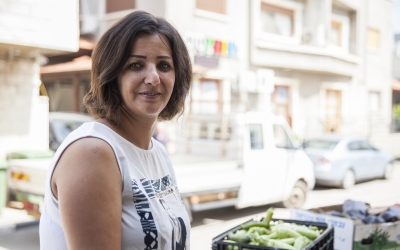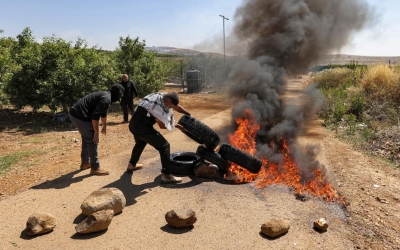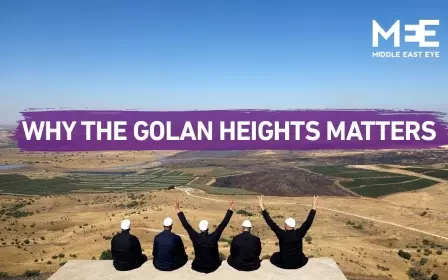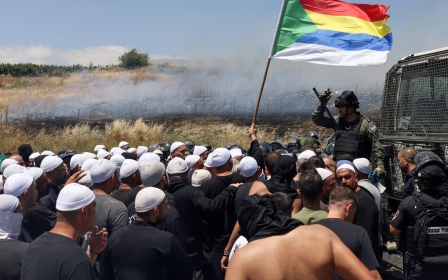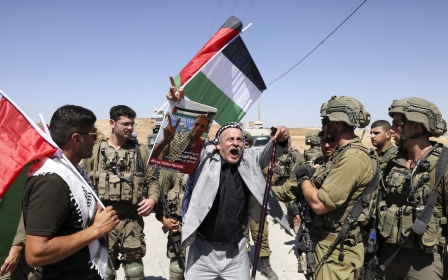Israel: Druze confrontation with the state is deeper than anger at wind farm
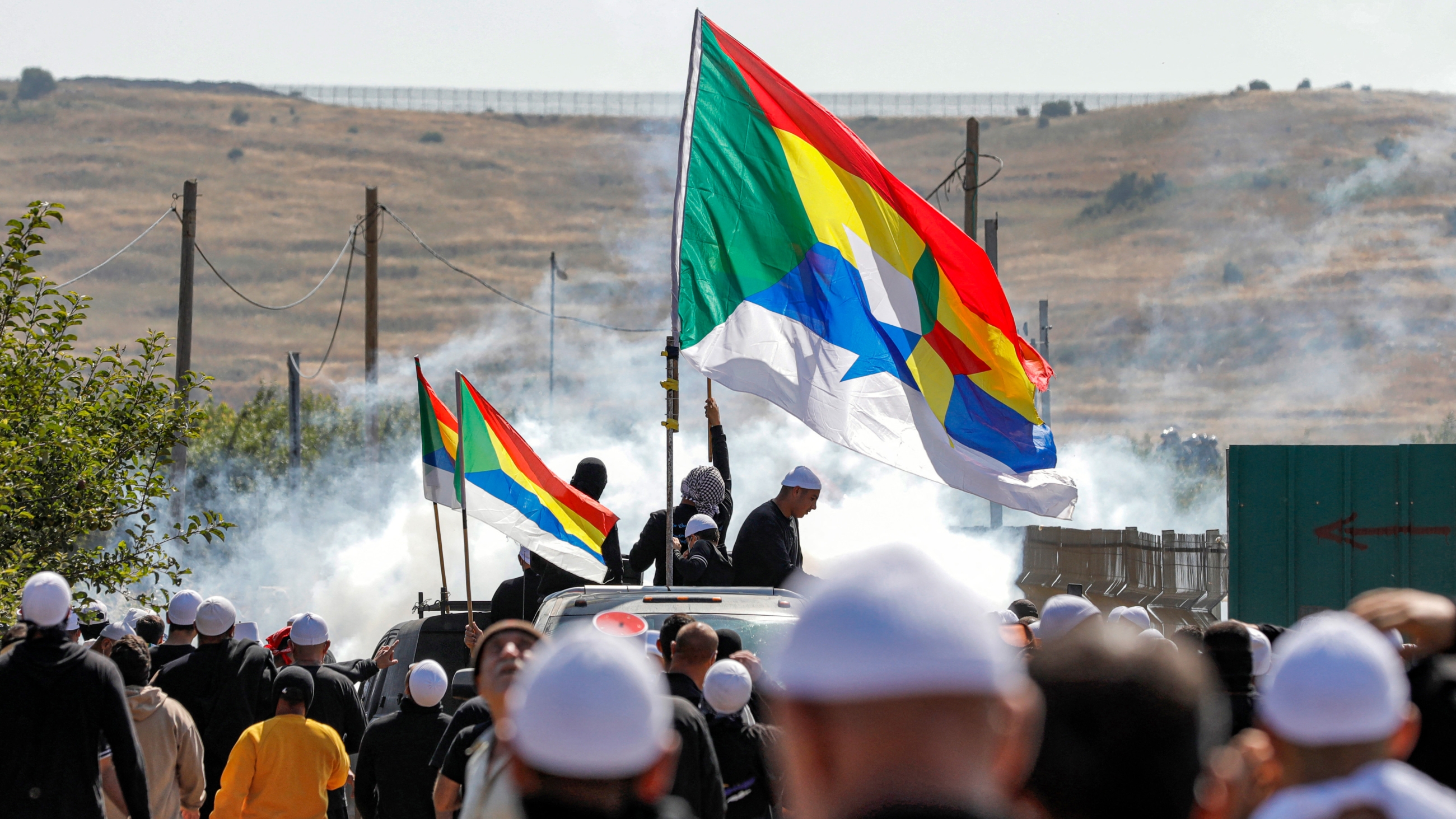
The outburst of rage in large demonstrations from Syrian Druze last week and the subsequent violent Israeli crackdown might seem out of proportion to those thinking it's only a protest against the wind farm in the occupied Golan Heights.
The Israeli project to build wind turbines on private Syrian land was certainly the trigger - but it unleashed deeper feelings of anger, hurt and humiliation which have been boiling for years.
Such feelings were aggravated by the passing of the Jewish nation-state law in 2018, which constitutionally enshrined the identity of Israel as a country for Jews only, forsaking all others.
The law prioritises Jewish supremacy over non-Jewish minorities - as does the current government, the first one to apply this supremacy so blatantly.
The nation-state law - which has been criticised as a racist bill contributing to apartheid - and the prevailing sentiment of Jewish supremacy in Israel affects all minorities, namely Palestinian citizens of Israel, both Muslim and Christian.
New MEE newsletter: Jerusalem Dispatch
Sign up to get the latest insights and analysis on Israel-Palestine, alongside Turkey Unpacked and other MEE newsletters
The Druze were somewhat viewed as an exception. For years, they have been integrated into the police and army forces, nicknamed by many Israelis "brothers in arms" and considered "the good Arabs".
But because of their conduct, and because they don't pose a threat to Israel, they receive less attention from authorities.
This neglect, along with the continued encroachment on Druze land on both sides of the border, is slowly triggering long-held grievances that threaten to rupture Israeli-Druze relations.
Protests and agreements
There are two groups of Druze people with close ties to one another; one living in the Golan Heights and the other living within Israel.
Around 25,000 people inhabit the occupied Syrian side, living mainly off tourism and agriculture.
The vast majority of them refuse to take Israeli nationality though they can. Only about 10 percent have become Israeli citizens while the rest maintain their Syrian citizenship.
The Golan Heights were occupied in the 1967 War and later annexed by Israel in 1981 in a move never recognised internationally.
UN Resolution 242 calls for Israel to withdraw from the Golan, which it recognises as part of Syria, and other territories it occupied in 1967, including Gaza and the West Bank.
Golan Druze say they have been forgotten for decades despite their continued protests against the policies imposed by the Israeli occupation, from the 1981 annexation to the recent wind turbine project.
Across the border, around 150,000 Druze live in about 19 villages in the northern district of Israel.
And although they share traditions and family ties with their Syrian counterparts, they have enjoyed a different relationship with the state of Israel.
In 1957, at the request of Druze communal leaders, the Israeli government designated Israeli Druze as a distinct ethnic community.
The Druze religious authority was also afforded a degree of independence from Islamic bodies.
In exchange - and unlike other minorities for whom military service is optional - Druze male enlistment became mandatory and the community was promised the privileges that come with military service.
Over the years, Druze have served as military generals, high commanders and pilots. More than 450 Druze soldiers, out of the small community, have lost their lives in military service.
Changing sentiments
Recent trends, however, show that Druze sentiments are changing.
A poll conducted by the Pew Research Center in 2017 found that the majority of Israeli Druze now identify as Arabs. Some even identify as Palestinians.
A decade earlier in 2009, research conducted by lecturer Salim Brake showed that only 11 percent of Druze identified as Arabs, the rest as "Israeli Druze".
Eight years between the two polls reflect a drastic change.
To understand this transformation and the intensity of the anger over the turbines, it's necessary to go back to the "Kaminitz law," named after the man who headed the committee that drafted the 2017 legislation.
On the face of it, the Kaminitz law is just an amendment to the Planning and Building Law, legislation regulating land use dating back to the British Mandate, which was later ratified in Israeli law by the Knesset in 1965.
The 2017 amendment officially intends to "increase the enforcement and penalisation of planning and building offences".
But in reality, it is a "discriminatory" law that does not take into account years of systematic prejudice against non-Jewish minorities in state land planning and allocations, according to the Haifa-based rights group Adalah.
'The basic Zionist ideology [is] that the land is 'ours,' the Jews - and everybody else is just foreign agents'
- Salim Brake, political science professor
This policy has caused a severe housing crisis in Palestinian and Druze villages, where residents have no solution but to build without permits and then face harsh repercussions from authorities.
"The underlying concept connecting the Kaminitz law and the current turbine crisis is the basic Zionist ideology that the land is 'ours,' the Jews - and everybody else is just foreign agents," said Brake, who was born in the Golan Druze town of Majdal Shams.
The political science professor at the Open University told Middle East Eye that Israel confiscated 60 percent of Druze land in the 1950s.
That land now serves as a reserve for future Jewish immigration to Israel while no new Druze settlement has been established since.
"We are hostages of an evil policy," Brake said.
"Two Druze generals now serve in the army, 'brothers in arms' you like to say. The moment the smallest conflict erupts, they turn into 'Arabs,' in the worst Jewish Israeli sense."
One struggle
The demonstration last week against the turbine project has united Golan Druze with those in Israel on the basis of solidarity but also because the main theme of the protests has revolved around the issue of land.
Druze in Israel have become an integral part of the protest, with some seeing the connection between the Druze struggle and the ongoing demonstrations against the government's controversial judicial reforms.
One of them is retired Brigadier General Amal Asad, who was one of the main speakers at last week's anti-government rally, as well as a participant in the Golan Heights protest.
Asad spent 26 years in military service and served in the highest positions.
He says that despite being loyal and committed to Israel, the conditions of Druze in the country are far worse than in neighbouring countries, like Syria and Lebanon.
"The Druze [in Arab countries] are Syrian or Lebanese, the Arabs in Israel perceive themselves as Palestinians," he said.
"We in Israel see ourselves as Israelis – but the state took away my national identity and left me with nothing. It hurts," he added.
Asad's activism has not come without a price, as he is quickly transformed from a "local hero" to almost a criminal agitator for speaking out.
Amichai Chikli, the minister of diaspora affairs, accused him on Twitter of acting as a marionette in the service of Ehud Barak, former prime minister and vocal leader of the ongoing protests.
Chikli claims Asad is used by Barak to incite the Druze community and drive a wedge between "us (the Jews) and our Druze brothers". Asad sent him a warning letter and a libel suit might follow.
That is just one personal offence, one of many missteps this government made dealing with the Druze question.
'Ready for war'
The major mistake came perhaps when Netanyahu sent the Minister of National Security Itamar Ben Gvir last week to meet with the spiritual leader of the Druze community, Sheik Mowafaq Tarif, to resolve the ongoing issue.
It was a big blunder to designate one of the most racist and provocative politicians to negotiate with the community leader.
"He is sending Ben Gvir to declare war on the Druze community," said local Druze leaders in response. "We are ready for war."
Ben Gvir came out of the meeting with an agreement to halt construction work until after the Eid al-Adha holiday on Wednesday.
Members of the Druze community rejected the temporary pause, demanding a permanent end to the project.
It's a demand that Ben Gvir will likely ignore, as he announced work on the project "will continue as usual".
He said this is what "governance" means; the Druze felt he was spitting in their face.
'An unprecedented response will come, one this country has never seen before'
- Sheik Mowafaq Tarif, Druze spiritual leader
Netanyahu himself added oil to the fire during the protests, which came at the same time as settlers violently rampaged through Palestinian villages in the occupied West Bank.
"I fully back up Israeli police and security force – we won't accept riots anywhere – not in the Golan Heights and not in Judea and Samaria," Netanyahu said, likening the settler mob to the native Syrian Druze.
And this crisis is far from over.
On Saturday, thousands of Druze participated in an emergency meeting in Kafr Yasif to discuss the next steps.
Sheikh Tarif warned that if the government refuses to accept their demands, "an unprecedented response will come, one this country has never seen before".
It's a package deal of demands: halt the installation of turbines on the farmland, cancel fines and demolition orders for houses built without a permit in Druze settlements, and above all – repeal racist laws like the Jewish nation-state law and Kaminitz law.
This will most certainly not happen under the current ultra-nationalist government, one that is pushing a bill to make Zionism a "guiding and crucial value" in policy-making, further implementing the Jewish nation-state law.
With one side determined to impose "governance" and the other "ready for war," the saga is only starting.
Middle East Eye delivers independent and unrivalled coverage and analysis of the Middle East, North Africa and beyond. To learn more about republishing this content and the associated fees, please fill out this form. More about MEE can be found here.


